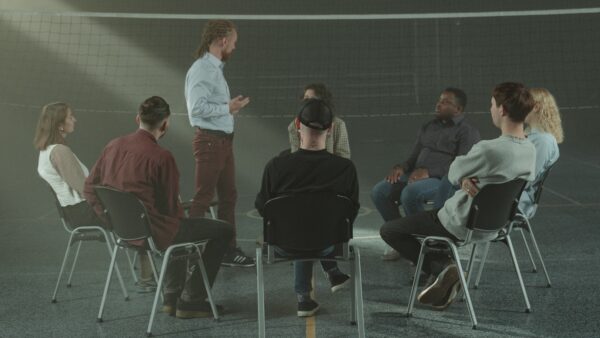3.1 Introduction
This unit is about cooperation where professionals work with peer support agents. Focus is on how to build an equal and respectful partnership, what is the role of the professional when working with a peer supporter and which might be challenging in such cooperation. The unit also considers the importance of the entire work community for the success of peer work in an organization.
3.2 Learning objectives
In this unit the learners will
- Learn how a good cooperation is born
- Understand the relationship and interaction between the professionals and the peer support agents
- Learn about the authority and responsibility of the professionals
- Learn about their own growth as professionals
- Understand the role of a peer supporter as a part of a multidisciplinary team
- Understand the benefits of cooperation when working with homeless people
3.3 Cooperation between professionals and peer support agents
When professional begins to co-operate with a peer support agent, both the professionals and the whole work community must prepare for the co-operation. Central to the development of peer support is the real effort to make the co-operation meaningful to all parties. The necessary financial and human resources shall be secured before commencing operations. Sufficient time should be set aside for the planning of joint intervention and the peer supporters to be should be involved at this stage.
Smooth collaboration between professionals and a peer support agents from different starting points is not a matter of course. The basic precondition for successful cooperation is that both, professionals and peer supporters, have a genuine desire to work together towards common objectives, support and learn from each other. In order to make this collaboration successful from the perspective of all agents involved— clients, professionals, peers support agents—enough time must be allocated to build a common understanding of the goals, contents and methods of the work. Setting clearly defined common goals brings a sense of purpose and security to work, as everyone has a clear understanding of what is being pursued. There should also be a space for discussion between the staff involved about their own personal values and the value base of the organization and consideration on how these values are reflected in working with homeless clients. The job descriptions and definition of tasks of professionals and peer support agents should be done at an early stage and it should be ensured that everyone’s tasks correspond to their skills, training and experience.
- The professionals are present and available
- Peer supporter is genuinely included in the team and is given the opportunity to participate in different tasks
- The peer receives ongoing support to work through the difficulties he may encounter in his daily tasks
- Mutual trust that allows for open discussion
- Peer support agent can honestly tell a professional about their own life situation and possible difficulties in it
- The work is flexible- and so are the professionals working with the peer- and can be adapted to the current life situation of the peer support agent
- Mutual chemistry and humour
- Professionals “interprets” professional language technicalities to the peer support agent if he’s not familiar with them
- Professionals help the peer supporter to network with other peer support agents
- The peer has access to work counselling by a coach/mentor who will help them deal with difficult cases, affront emotions aroused by challenging situations or circumstances, etc.

When working together, the relationship between professionals and peer support agent is very important. It is important that they work towards developing the so-called mutual chemistry so that all parties can feel at ease working together, and peer support agents can feel free to be themselves.
A fruitful cooperation requires trust. Within a working team, getting to know each other step by step and familiarizing with the work tasks together promotes the building of trust. In addition to trust, peer support agents see humor and professionals’ openness as important things to increase interaction. It is important for a peer support agent that the other professionals share some information from their own life as well. However, such openness can challenge professionals, especially if they are used to work in teams where little private information is shared.
It is important for the professionals to think in advance about their own preconceptions. For instance, do they perceive the peer support agent more as client or as a co-worker? Can a peer support agent be both, a client and a co-worker?
Peer support agents who are hired by organizations that once served them may become colleagues of their former service providers. They may work together closely as a team or, at least, participate in joint staff meetings or events occasionally. Practical experience shows that these interactions may work perfectly well, yet they may also complicate boundaries because of the shift from the status of client to the status of former client and colleague. Particular challenges can arise if former clients who become peer support agent require services again from this very same organization. An eventual double role of the peer support agent requires discussing it openly at the beginning of the collaboration, so that both parties can express their wishes, fears and set common rules. It is also understandable that peer support agent may want to keep their personal life and work separate, at any stake. In this case, the organization shall make sure that none of the team of co-workers are in a therapeutic relationship with the peer supporter in question.
Starting collaboration with a peer supporter raises questions in professionals. What can the professionals discuss with the peer support agent when conducting a joint intervention or supporting the peer support agent in their functions? Can professionals share their own feelings of frustration or insecurity? Would it be considered openness and transparency or a burden for the peer support agent? Since part of the role of a professional is to support the peer supporter on the job, it is convenient that the professionals also have their own support network of fellow professionals and/or a supervisor to help them deal with certain situations and solve certain dilemmas.
Authority and responsibilities
Professionals can learn a lot from peer supporters but it requires that they understand that they have no obligation to be always right because of their professional status. This requires professional self-confidence for the professionals to be able to welcome feedback from peer supporters. Professionals should also have compassion for themselves and the members of their team. Everyone makes mistakes sometimes and it is not always possible to do the job as well as one would expect to do. Communicating this to a peer supporter is important so that they can understand the different situations they will face when working with professionals.
The professionals must be able to renounce their professional power to some extent. It won’t be possible to do without the professionals constantly monitoring and reflecting on their own ways of working and asking the peer supporter for feedback. In practice, this means that, despite the responsibilities and obligations of professionals collaborating with peer supporters, the latter can work independently, make decisions and take on different job roles. The better the professionals in the team know the peer supporter, the easier the division of responsibilities and tasks will be. Giving responsibility and tasks is always done based on individual situation and in collaboration with the peer in question.
If the peer supporters are not given enough responsibility, they may find themselves useless and irrelevant to action. They may also feel untrustworthy. Contrarily, if they are given too much responsibility, there is a risk of burnout. Peer may not always recognize or measure their resources adequately. Enthusiasm is usually great at the start of work and peer supporters may want to work more than they can handle. Many peer support agents also feel that they have to prove to professionals that they are able to work, and therefore do more than they can handle. This is why it’s important that the professionals from the team look out for the well-being of the peer and, if necessary, limit his working hours and work tasks.
Professional growth
When working with homeless people, the social professionals are experts in their field. Expertise manifests itself as a professional solves difficult situations and overcomes challenges combining theoretical knowledge with practical experience. Usually, the professionals do not have to consider on which theory their solution or action is based, but the theory and practice are intertwined. Professional identity includes values and ethical dimensions of work, as well as goals and beliefs. The notion of what the professional feels and belongs to and what he considers important in his work deepens his professional identity.
When working with peer support agents- who have a first-hand, experiential, and in-depth expertise-, individual knowledge and skills of both parties combine and create a new basis of expertise. Shared expertise is especially needed in field work where issues are delicate and challenges complex. Often, professionals have not experienced the same things in first-person as someone who experienced homelessness. With help from peer workers, professionals can understand better the reasons that lead to homelessness, which helps them to plan interventions and allocate resources in a more effective way. At its best, professionals can learn alternative perspectives and empathy from a peer support agent, which will broaden their resources to attend most vulnerable clients.
A professionals’ support network is a good way for professionals to develop their skills. Practicing interaction skills, conducting dialogues and deeper understanding of both inclusion and community develops the capacity of professionals to work with peer support agents. Knowledge about trauma, substance abuse and mental health work is also useful. Experience proves that trainings carried out between professionals and peer supporters are particularly useful, as they give a chance for both groups to mutually broaden and deepen their expertise.

Peer supporter as a part of work community
Peer support agents have the right to receive on-the-job training so that they know what is expected of them. If this is not done, it is possible that the role of the peer supporter in the organization will be unclear to both the peer and the professionals, leading to misunderstandings and the peer worker not receiving sufficient support. At the very beginning, it shall be made clear what are the responsibilities of the professionals in the team with regards to the peer supporter and in what situations the peer supporter can contact a supervisor if necessary. It is important that all the employees at the organization are familiar with the figure of peer supporters and commit to supporting their integration in the organization, even if the latter don’t form part of their working team/department. This will help the peer support agents feel comfortable at work.
In a mixed working team, where professionals work hand in hand with peer supporters, there is a risk that the a professional might develop a role similar to that of a supervisor in relation to a peer supporter, while he hasn’t been appointed to such a role. Even though, in matters related to the technical aspects of the work, the role of the professionals can be guiding, it is a good idea to point a person of reference in the organization whom the peer supporter shall contact if there are challenges with any of the professionals they cooperate with. However, experts by experience themselves believe that the best way to prevent problems is for the organization to be well prepared and genuinely interested in working with peers.
| What the management an organization should take into consideration when planning to involve peer support workers/experts by experience | · Preparation of the staff for inclusion of peers in the work community e.g. by informing them about aims, input and the added value the engagement of peer support workers brings to the organization. · Support and supervision of the management are essential for strengthening the peer support worker’s self-confidence in their skills and expertise, and the support workers and experts by experience must be able to trust that the management backs them up whenever is needed. · Offering peer support workers an opportunity to get training and/or otherwise ensure that they will be provided with adequate information and tools to carry out the job. | · To relieve and avoid work-related stress, management needs to assure adequate supervision (desirably hired from outside of the organization). · Constant dialogue between other peer support workers, supervisors and the rest of the staff can prevent misunderstandings, improve work atmosphere and thus, it a key to successful teamwork. · Management should have a comprehensive interest in the life history of peer support workers/experts by experience as they use their lived experience as a central tool in their work. |
Benefits of peer support in work with homeless people
In work with homeless people, service users benefit when professionals and peer support agents work together. Peer supporter can identify with the client’s situation and can assess what kind of services could meet the client’s needs best. The professionals, in turn, are able to tell about the available services and how they could benefit the client. The peer supporter knows the concrete shortcomings of the service system from the point of view of a user, which professionals do not always recognize. Being able to identify these shortcomings helps professionals in successful case management. The language of the service providers can sometimes be difficult for those who experience homelessness. The presence of a peer supporter can be useful to facilitate a common understanding between the client and the service provider. A peer supporter may also find it easier to articulate client’s feelings and needs, especially if the client’s life situation is chaotic. A dual role of a peer supporter as both a fellow traveler and a services attendant is important to many peers. Additionally, the division of work can reduce the workload of the professionals and release resources for, e.g. a simultaneous coordination of the service paths of several clients.
Cooperation between professional and peer support agent brings equality to the encounter between the client and the professionals. In homelessness work, the interaction relationship is built on an appreciative encounter, where trust is created as a mutual feeling. Trust is a basic condition for clients to dare to tell about their situation, to be heard and to receive the help they need. Peer supporter’s presence often serves as a kind of a bridge between the clients and the professionals to meet professionals. Also, the fact that the client sees a peer supporter and a professional working smoothly together increases the confidence that it is possible to get help from the service system. Working together, peer support agents and professionals can get a more comprehensive view of the client’s situation. The peer supporter is able to pay attention to details the professional may not notice, such as nonverbal communication. Additionally, the client is also likely to share with the peer supporter information they wouldn’t share with a professional.
One of the most important benefits of cooperation is how peer support creates hope and reduces the client’s feeling of shame because of their situation. When hope ignites in a client, he begins to work to promote his own well-being. Minimizing shame and stigma is also important. In work with homeless women in particular, it is known that feeling ashamed of own situation is one of the most significant reasons why a woman does not turn for help.
With own professional skills, professionals are likely to help a peer supporter uphold faith in cases when the situation of a client seems hopeless. However, situations do not always seem difficult only to peer supporters, hopelessness can also catch on to professionals. In these situations, the peer supporters and the example of their recovery process can help professionals keep up the hope. The benefit is bilateral— the peer supporters and the professionals empower each other mutually. For a professional, this increases confidence in their own skills as a professional and has a positive effect on well-being at work.
For a real example of collaboration between a social professional and an expert by experience in a Finnish project called NEA, supporting young women experiencing homelessness, watch this video: NEA-hankkeen päätösvideo
3.4 Further reading
- Budapest Methodological Centre of Social Policy and Its Institutions, Guide for professionals in housing support, 2018.
- Meriluoto, Making experts-by-experience – Governmental ethnography of participatory initiatives in Finnish social welfare organisations. Universidad de Jyväskylä, 2019.






